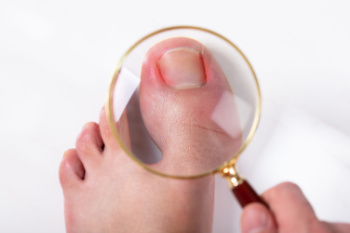What Is an Ingrown Toenail?
Tuesday, 16 April 2024 00:00
An ingrown toenail, a common foot condition, occurs when the edge of the toenail grows into the surrounding skin, leading to pain, swelling, and discomfort. This condition typically affects the big toe but can occur on any toe. Ingrown toenails can develop due to a variety of factors, including improper nail trimming techniques, wearing tight-fitting shoes, or sustaining toe injuries. Additionally, individuals with curved or unusually shaped toenails may be more prone to ingrown toenails. Symptoms of ingrown toenails include redness, tenderness, and inflammation around the affected nail, as well as the presence of pus or drainage in severe cases. If left untreated, ingrown toenails can become infected, causing further pain and complications. Recognizing the causes and symptoms of ingrown toenails is important for prompt treatment and prevention strategies. If you have developed an ingrown toenail, it is suggested that you contact a podiatrist who can treat this condition, which may include minor surgery for partial or total removal.
Ingrown toenails may initially present themselves as a minor discomfort, but they may progress into an infection in the skin without proper treatment. For more information about ingrown toenails, contact one of our podiatrists of Accent Podiatry Associates. Our doctors can provide the care you need to keep you pain-free and on your feet.
Ingrown Toenails
Ingrown toenails are caused when the corner or side of a toenail grows into the soft flesh surrounding it. They often result in redness, swelling, pain, and in some cases, infection. This condition typically affects the big toe and may recur if it is not treated properly.
Causes
- Improper toenail trimming
- Genetics
- Improper shoe fitting
- Injury from pedicures or nail picking
- Abnormal gait
- Poor hygiene
You are more likely to develop an ingrown toenail if you are obese, have diabetes, arthritis, or have any fungal infection in your nails. Additionally, people who have foot or toe deformities are at a higher risk of developing an ingrown toenail.
Symptoms
Some symptoms of ingrown toenails are redness, swelling, and pain. In rare cases, there may be a yellowish drainage coming from the nail.
Treatment
Ignoring an ingrown toenail can have serious complications. Infections of the nail border can progress to a deeper soft-tissue infection, which can then turn into a bone infection. You should always speak with your podiatrist if you suspect you have an ingrown toenail, especially if you have diabetes or poor circulation.
If you have any questions, please feel free to contact our offices located in Arlington and Mansfield, TX . We offer the newest diagnostic and treatment technologies for all your foot care needs.
Blog Archives
- December 2024
- November 2024
- October 2024
- September 2024
- August 2024
- July 2024
- June 2024
- May 2024
- April 2024
- March 2024
- February 2024
- January 2024
- December 2023
- November 2023
- October 2023
- September 2023
- August 2023
- July 2023
- June 2023
- May 2023
- April 2023
- March 2023
- February 2023
- January 2023
- December 2022
- November 2022
- October 2022
- September 2022
- August 2022
- July 2022
- June 2022
- May 2022
- April 2022
- March 2022
- February 2022
- January 2022
- December 2021
- November 2021
- October 2021
- September 2021
- August 2021
- July 2021
- June 2021
- May 2021
- April 2021
- March 2021
- February 2021
- January 2021
- December 2020
- November 2020
- October 2020
- September 2020
- August 2020
- July 2020
- June 2020
- May 2020
- April 2020
- March 2020
- February 2020
- January 2020
- December 2019
- November 2019
- October 2019
- September 2019
- August 2019
- July 2019
- June 2019
- May 2019
- April 2019
- March 2019
- February 2019
- January 2019




